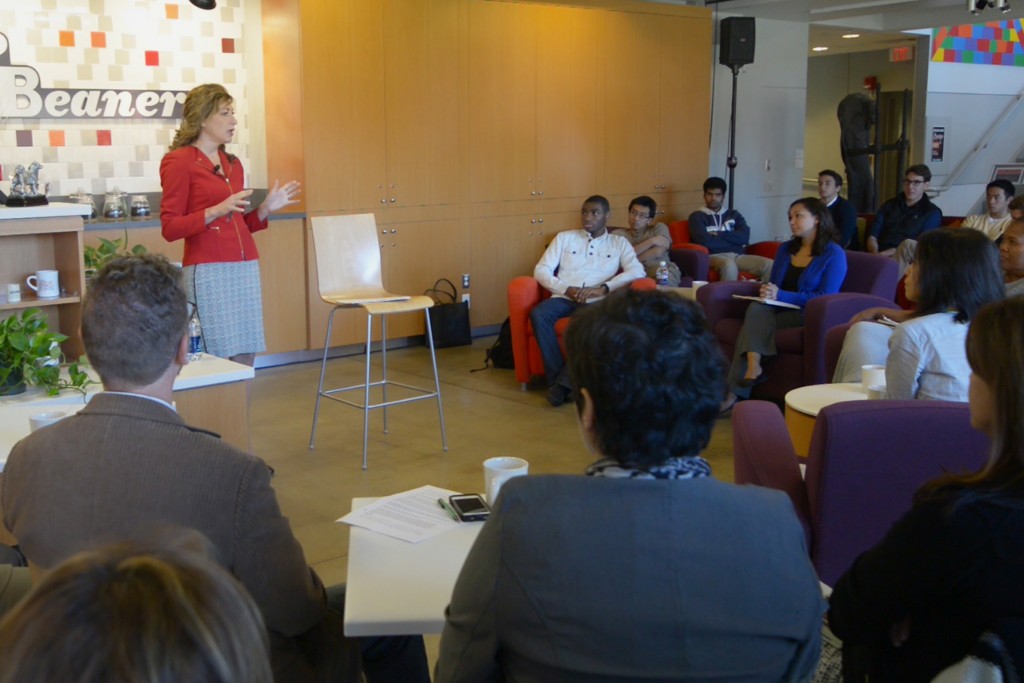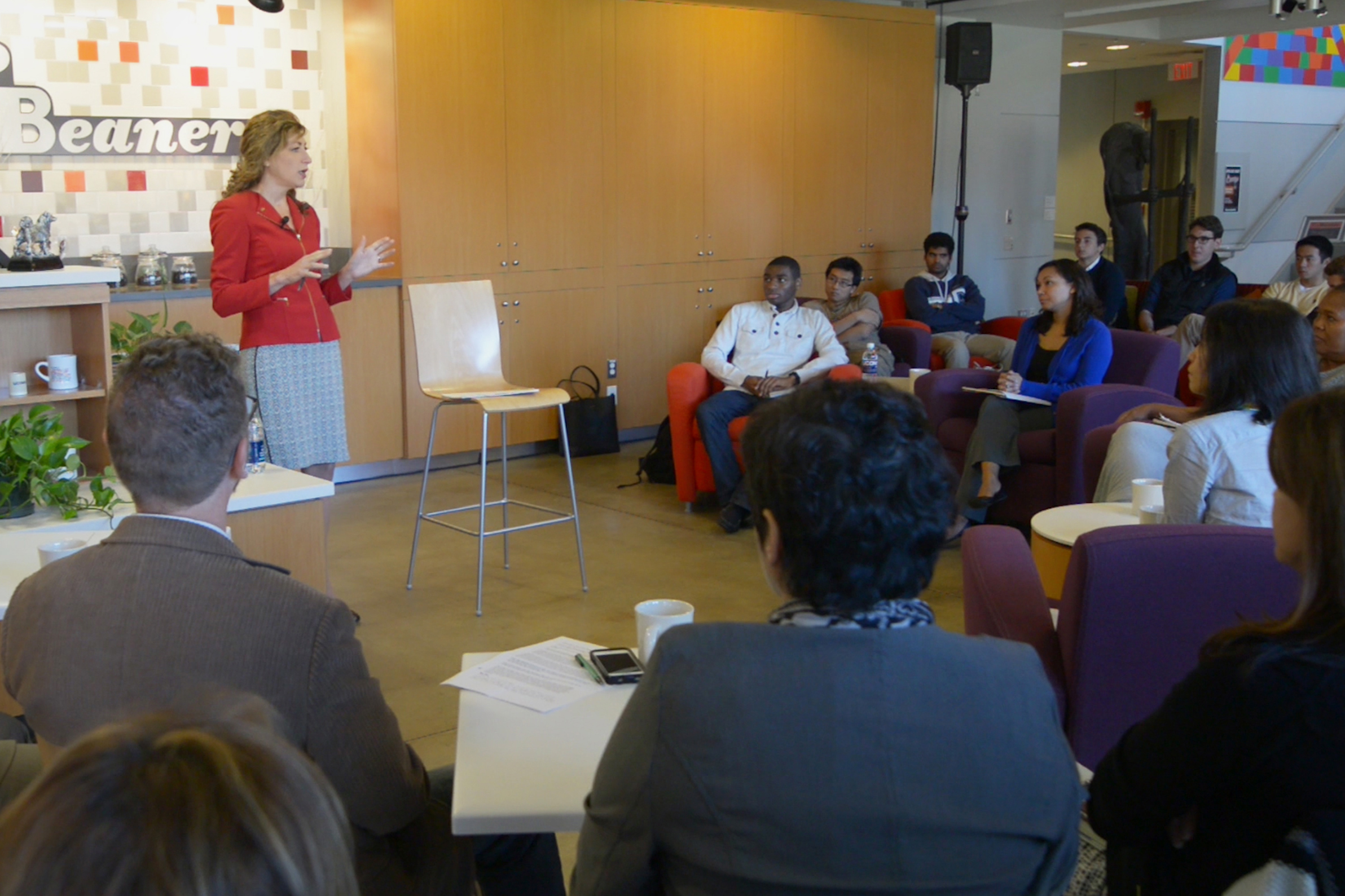At a meeting of the Board of Trustees on Nov. 18, President Herbst spoke about the value and imperative of embracing diversity at the University, both in light of recent events in Paris and around the world, and in preface to a summary of a report on diversity presented to the board by the co-chairs of the task force that developed it, Daniel Weiner, vice provost for global affairs, and Dana Wilder, assistant vice provost for academic affairs.
We pride ourselves on being a global institution. And so it was no surprise that we had a number of students and faculty in Paris this past weekend. We have several French students studying here at UConn. We also have many alumni in Paris, and a few wrote to us in moving gratitude: They felt part of the worldwide UConn Nation, even as their physical nation was challenged in a most brutal fashion.
UConn, like the world, was mortified by these horrific attacks.
Our own students and faculty are safe, and the University has reached out to students from France and neighboring nations who are studying here, to offer assistance.
Whether it is the violence that takes place in Paris, Beirut, or Charleston, S.C. – senseless hatred is the common thread that runs through these events and so many others.
When tragedies happen, you hope that it will bring out the best in people. It often does.
As individuals, one of the best ways we can respond to violence, hatred, and tragedy on the other side of the world, or here at home, is by building stronger communities.
As a collective, we gather. Over the weekend, our students attended vigils on campus to remember the victims of the Paris attacks. A few days later, they held a rally against intolerance and racism here at home.
Individual action matters, as does group and institutional action. The words we speak, the actions we take, the structures we build, all say something about us, and echo over time.
The way we treat each other matters.

One of my favorite chapters in the history of UConn goes back a while and I think of it often, thanks to campus historian Bruce Stave.
In 1949, a young man named Alfred Rogers enrolled here as a student. He was a talented musician – earning a spot in the All High School Band – an athlete, attended Boys State in 1947, and was elected president of his freshman class at UConn.
The following year, 1950, he pledged a fraternity on campus, Phi Epsilon Pi; where, as a popular and outgoing student, he quickly made great friends. And so, later that year, the chapter sought to initiate him into the fraternity, and sent their friend’s name along to their national organization for approval.
But word came back that the national fraternity leadership had vetoed Alfred, refusing to approve his initiation. The reason, they said, was because Alfred was black.
The members of our UConn Chapter responded, saying that they would rather give up their charter, move out of their fraternity house, and cease to exist, than follow this cruel, racist dictate aimed at their friend.
And, not satisfied with that resistance alone, members of the UConn Chapter traveled to other colleges across the region, in an effort to gain support from other chapters, to follow their lead and do the same, should the fraternity continue to bar Alfred from membership. Making national news, eight other chapters agreed and joined the UConn effort, also threatening to leave the fraternity.
Later that fall, the national office relented. Upon getting the news, the Phi Epsilon Pi chapter president sent a telegram to UConn’s president at the time, President Jorgensen. It read: “Alfred Rogers may be initiated at any time.”
And so he was.
When we talk about ‘diversity,’ ‘inclusion,’ and ‘non-discrimination’ in higher education … we’re talking about human beings and the lives they lead. — President Susan Herbst
Alfred went on to graduate from UConn in 1953; served in the U.S. military, had a successful career in the private sector; and was a highly respected civic leader in the City of Hartford for many years.
In 2006, he was invited back to campus for a major event celebrating UConn’s 125th anniversary. As Alfred stood at the podium in the North Reading Room of the Wilbur Cross building, he told this long-ago story about his experience at UConn to the audience.
As he told it, more than 55 years after it happened, he spoke haltingly, his voice choked with emotion as he recounted his classmates at UConn, standing up for him in defiance of bigotry and injustice, half a century earlier.
That is only one example of our UConn history as an open, progressive institution, based on respect.
When we talk about “diversity,” “inclusion,” and “non-discrimination” in higher education, we’re not rattling off buzzwords for public relations value. We’re talking about human beings and the lives they lead.
Knowing that, one of the best and most important things we can do is make sure that UConn reflects the diversity of the nation.
That doesn’t happen by accident; we have to bring it about. And we have an obligation to reach out to people who may not be reaching out to us. Because a diverse classroom, residence hall, or office is a richer, more vibrant, more rewarding place than one that is not.
We have made great strides in recent years with our undergraduate student population: about a third of our recent incoming freshmen classes have been minority students. We’ll build on that success.
Diversity among our faculty and staff does not come close to these undergraduate figures. And it must.
Having previously led diversity initiatives in Georgia across 35 colleges, and overseeing three outstanding Historically Black Colleges and Universities, I was surprised to find a lack of diversity among UConn faculty when I arrived here.
As I have said since the month I arrived, faculty must put in the work it takes to recruit diverse colleagues. Faculty recruit faculty.
These are the many reasons why the Provost and I established the Task Force on Diversity last year. Its report was completed in August.
I accepted all of the task force recommendations in the summer, as I noted to the campus when distributing it widely earlier this fall. It begins with hiring of an associate vice president and chief diversity officer, who will – reporting to me – educate and motivate members of this community to fully embrace diversity and inclusion as core values to be collectively practiced at UConn.
This position was developed then posted weeks ago; we are currently recruiting.
Thank you.
For the full text of the Diversity Task Force report, see this pdf.



